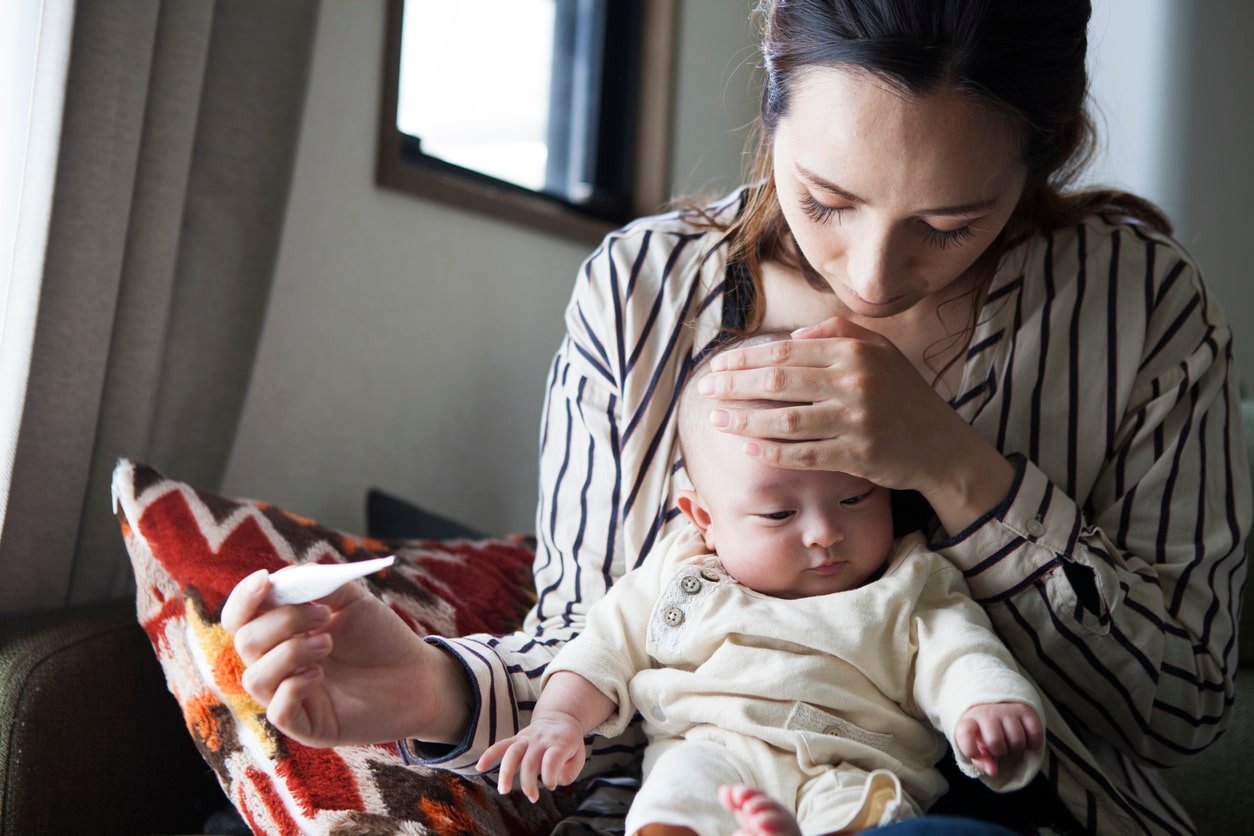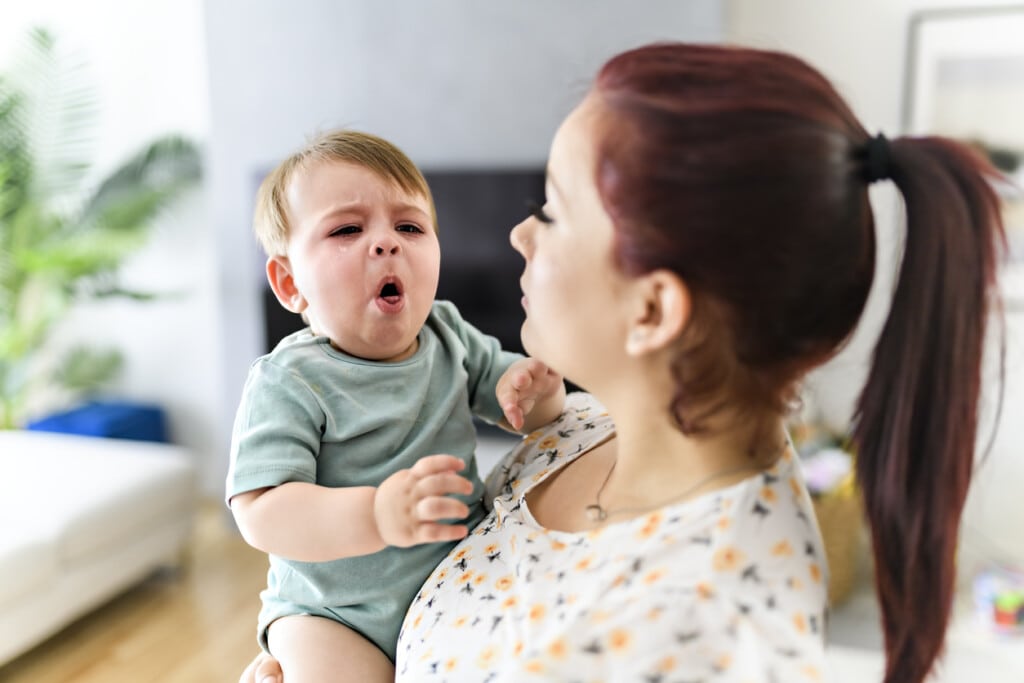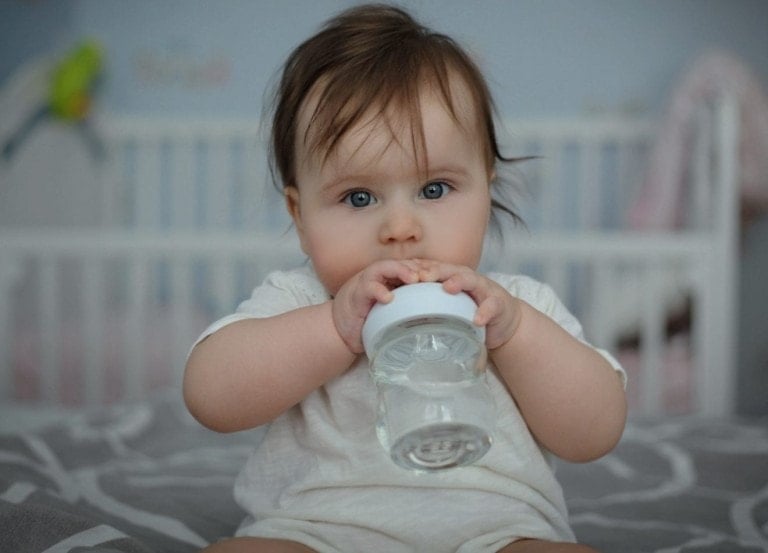When your baby gets a cold with a runny nose, nasal congestion, and a cough, what can you do to help them feel better? Many parents look in their medicine cabinets or run to the local store to get over-the-counter infant cough medicine. Even though the box says to consult a doctor if giving it to children under 2, some decide to give half the dose listed to their baby without talking to their pediatrician, which can be life-threatening.
While taking the easy route like this is tempting, most children with a viral illness will improve without using infant cough medicine.4 Let’s explore how to help our babies feel better and when to call the doctor.
How Common are Colds and Coughs in Babies?
A baby typically has six to eight colds or coughs in their first year. This number can increase if they are in a daycare setting around other children.5 A baby or infant cough can be very concerning for parents since many viruses can affect their children. Some viruses can be severe, including the flu (influenza), pertussis (whooping cough), respiratory syncytial virus (RSV), and COVID-19. Amazingly, your baby has a built-in immunity that can help protect them from such illnesses. This temporary immunity comes from the mother through the placenta. It’s in place to help protect the baby as soon as birth. There continues to be some immunity support through breast milk (breastfed or expressed). This immunity generally lasts about six months.6,7
Can You Give Your Baby Cough Medicine?
You should NEVER give your baby cold or cough medicine without consulting your doctor. According to the American Academy of Pediatrics (AAP), 61% of parents will give their babies over-the-counter cold and cough medicine without talking to their doctor.1 This can be dangerous. In a study of 10 infants who died under mysterious circumstances, some of their deaths were linked to OTC infant cough medicine.3 The Food & Drug Administration (FDA) then released a public health advisory that OTC infant cough medicine and baby cough syrup should be recalled. Because of this, no OTC medicines are labeled “infant cough medicine.”
What About Home Remedies or Medicines for a Baby’s Cough?
Several home remedies can work well to help your baby’s cold and cough symptoms:2
- Humidifier: Using a cool mist humidifier in the baby’s room can help ease congestion.
- Saline drops: Saline nasal drops can help clear nasal passages.
- Bulb syringe: Use this, and the saline drops, to suction excess mucus from the nasal passages.
- Elevating the head: Propping the infant’s head during sleep can help breathing.
- Drinking plenty of fluids: Ensure the baby is well-hydrated.
When To Call a Doctor

If your baby has a cold or cough, it will most likely resolve itself with time, extra special care, and some home remedies. But call your doctor if the cold seems to get worse or lasts too long or if any of the following occurs:4,5
- If your baby is younger than 3 months, call the doctor early in the illness. In newborns, ensuring that a more serious condition isn’t present is crucial, especially if your baby has a fever.
- Your baby isn’t making as many wet diapers as usual.
- There is a fever of 100.4 degrees Fahrenheit or higher.
- They are unusually irritable or seem to have ear pain.
- You notice yellow or green mucus coming from the eyes, or their eyes are red.
- They have a persistent cough that prevents sleeping.
If you see these more severe symptoms, call your provider immediately:4,5
- The baby refuses to nurse or take any fluids.
- They cough so hard it causes vomiting or skin color changes, especially blue coloring around the lips.
- You see blood-tinged mucus.
- The baby is having difficulty breathing.
- They are very sluggish, have low energy, or are excessively sleepy.
- You hear them wheezing.
Tips To Help Your Baby If They Have a Cough or Cold
There are several things you can do if your baby has a cough or cold, mainly to prevent the spread of any illness:5,8
- Keep the child’s head elevated to allow mucus to drain out of the head.
- Wash your hands frequently to avoid passing germs to each other. Alcohol-based hand sanitizers are suitable for this, too.
- Disinfect (at least once a day) commonly touched areas by the whole family, such as doorknobs, toilet handles, water faucet handles, cellphones, TV remotes, etc.
- Don’t share drinking cups or utensils; don’t clean the baby’s binky by putting it in your mouth, or you might catch the same illness.
- Give your baby small amounts of fluid if they have trouble swallowing, or make homemade popsicles from breast milk or formula.
- Monitor their temperature frequently.
Giving cough medicine to an infant should only be done under the guidance and supervision of a pediatrician or healthcare professional. Infants have delicate systems, and certain cough medicines may not be safe or effective. Most cough medicines are not recommended for children under a certain age. The AAP advises against using over-the-counter cough and cold medications for children under the age of 2.1
































